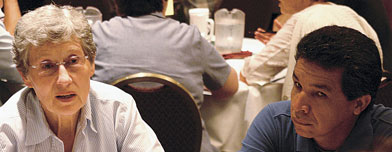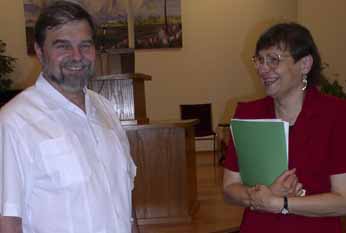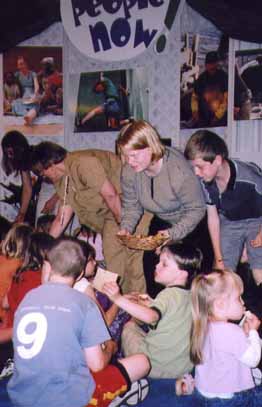Canadian Mennonite
Volume 10, No. 15
July 31, 2006

Membership, foundation verse occupy assembly delegates
Edmonton
Additional ResourcesIn addition to our print coverage here, readers can find complete news coverage, as well as browse through photo galleries, view presentations, listen to audio recordings of sermons and stories, and watch video clips presented at the delegate sessions, by visiting Canadian Mennonite’s online assembly special report. Ed. |
At the national church’s annual delegate sessions earlier this month, Mennonite Church Canada delegates voted to loosen membership requirements, backed two methods for rooting the church in Scripture, and started a process to petition the government for a peace tax alternative.
A total of 314 delegates—281 from congregations and 33 from area churches—attended the delegate sessions held in Edmonton from July 4 to 7. This was a 35 percent jump in delegate attendance over last year’s assembly in Charlotte, N.C.
Delegates met for three morning and two afternoon discernment sessions (using the now established and appreciated roundtable discussion format), worshipped together each morning and evening, attended a number of seminars, and enjoyed the hospitality of Alberta Mennonite churches.
Area Conference Only Membership approved
After extensive back-and-forth discussion on the issue of local church membership, delegates voted by an 80 percent margin to loosen local church membership requirements.
This decision opens the way for any of the five area conferences to allow a local congregation to be a member of the area conference without being part of the national church as well. This was described as Area Conference Only Member (ACOM) status. Current MC Canada bylaws define any church that is a member of an area conference to also automatically be a member of the national church, leaving congregational membership decisions up to each area conference.
Currently, six congregations in British Columbia and one in Alberta have indicated they wish to remain part of their respective area churches but not the national church.
MC B.C. churches have had the option to be members of just the provincial level of the church for the past five years under a temporary arrangement that expires this summer. This decision by delegates provides a way to make that temporary membership option permanent, as well as extending it to the rest of the country.
The major reason B.C. churches want to leave the national church is due to congregations in other parts of Canada accepting practising gay and lesbian couples into membership, according to MC B.C. moderator Gerd Bartel. MC B.C. assistant moderator Karen Heidebrecht Thiessen said the issue was a broad one of congregations reluctant to be a part of MC Canada when the national church has little ability to determine whether a given local congregation is a member or not.
“The reality has been that area conferences tend to [determine membership criteria] in relative isolation,” she said. “The more we can create a spirit of trust and unity between area conferences, the more relationships we can build, the more willingness and desire there is to work through differences and to have flexibility with one another, and to learn to trust and love each other. I think that is what is lacking at this time.”
Speakers lined up at each of the microphones to speak to the resolution and to the general issue of what membership should mean in the church. While the vote was strongly in favour of ACOM membership, speakers were more evenly split.
Doug Amstutz, pastor of Grace Mennonite Church, St. Catharines, Ont., made the theological comparison to how, in Mennonite practice, baptism is not separated from church membership or commitment to the church. “Are we saying it is okay to separate ourselves from the body to further certain principles?” he asked.
“We either pilgrim together or we don’t,” said Bill Kruger from Nutana Park Mennonite Church, Saskatoon.
“We would speak against the resolution. We believe that it is planning for disunity, [rather] than planning for unity,” said Dave Kroeker of Abbotsford (B.C.) Mennonite Fellowship.
Two repeated themes among those speaking for the resolution were that this was a pragmatic decision given difficult circumstances and that it was a pastoral way of extending grace to churches struggling with the national church.
“This is the best way we can work at the sense of unity of Christ at a time when organizational unity isn’t possible in every way. We do see it as second best, but we do affirm it,” said Harold Peters-Fransen.
“Rather than seeing this as a way out for people, I see it as a way of keeping the door open for people, and for churches to be part of us again,” said John Klassen, director of Leadership Ministries for MC Manitoba.
An amendment to add the option for local congregations to be members of the national church but not their area conference was voted down by delegates.
Delegates also later considered two further resolutions on the subject. These were requests to the area conferences and local congregations to not let the newly available ACOM option decrease their allegiance to the national church. Area conferences were also asked to establish clear conflict-of-interest guidelines. Local churches were asked to find ways to include MC Canada in new members’ instruction and ceremonies to foster a commitment to local, area conference, national and international church levels, “with the rights, privileges, and responsibilities thereto.”
Delegates did not vote on either of these resolutions, but there was strong support for them from the floor. “We have a general feeling that we need to be generous,” said Tracy Brown Ewert, expressing hopes that churches choosing ACOM status might desire to re-covenant fully with the national church in the future.
Bartel expressed gratitude to delegates on behalf of the B.C. conference most affected by the ACOM option. “I would like to thank MC Canada for really being hospitable and practising grace in terms of this position,” he said. “We would like to commend you for going the extra mile and extending your hand of welcome.”
MC Canada bylaw changes will be needed to reflect what delegates decided in Edmonton. Two months’ advance notice is needed for bylaw changes, so these are planned for next year’s assembly.
 |
Building the church’s Scriptural foundations
Assembly 2006 delegates wrestled through a tabled resolution and then two follow-up resolutions, which resulted in an official scriptural foundation for the national church as well as a rotating focus on selected biblical texts.
One resolution selected a foundational scripture text—I Corinthians 3:11: “For no one can lay any foundation other than the one that has been laid; that foundation is Jesus Christ.” This was a guiding verse for Menno Simons, the 16th century church reformer from whom Mennonites take their name.
The second resolution directed that the church choose additional key biblical texts for study and nourishment, to be changed every two years. Study resources on the passage are to be created and distributed to congregations to encourage a deeper understanding and application of the Scriptures in their lives.
The MC Canada General Board initially proposed the church only have the rotating scripture text. While there was general affirmation for study of a number of biblical texts, delegate discussion also affirmed a desire for a more permanent scripture foundation that “our children could grow up with.”
Some also expressed disapproval about the rotating text resolution because it changed a decision that delegates had already made. Two years ago, at the Winkler, Man., assembly, delegates unanimously passed a resolution that a single scripture motto be chosen for the church in 2006. However, I Corinthians 3:11 was voted down at that time as the choice for the verse.
Randy Klaassen of Bethany Mennonite Church, Virgil, Ont., noted that, after the 2004 assembly, congregations had been invited into a congregational discernment process for selecting and nominating a scripture foundation passage. “We [Bethany Mennonite Church] did our homework at the request of MC Canada,” he said, expressing some frustration at having to consider a rotating text approach.
The Resolutions Committee later returned with a two-part resolution that backed both approaches simultaneously: first, that delegates choose a single scripture foundation verse; and second, that a rotating scripture foundation verse be used for two consecutive assemblies.
When this resolution passed with a large majority, a second resolution was moved that Mennonite Church Canada choose I Corinthians 3:11 as its foundational scripture verse. This time, this resolution also passed easily.
Protesting military taxes
A resolution from the floor, put forward by Harold Peters-Fransen, addressed Canada’s rapidly expanding military activity.
The resolution stated that, as the government was moving increasingly towards direct military intervention, was increasing military spending and forcing conscientious objectors to contribute to the military budget through taxation, that the General Board urge “the government to enact legislation which would allow conscientious objectors to direct the military portion of their taxes to activities of development and peace.”
“Major changes are taking place,” said David Neufeld of Herschel Ebenfeld Mennonite Church in Saskatchewan. “I believe it is time for us to speak and to request that some serious consideration be given to this resolution.”
The resolution was passed almost unanimously.
Budget approved
Audited financial statements for the fiscal year ending January 2006 were presented showing the national church had a surplus of about $114,000. Donations were up slightly, the first time they have gone up year-over-year since the 2002 financial restructuring.
Delegates passed the national church budget for 2006-07, with planned net spending of $4.12 million, very slightly less than the previous year’s budget. The budget expects a deficit of $118,000, which will be covered with a transfer from reserves.
Suderman tour appreciated
MC Canada general secretary Robert J. Suderman presented a powerful presentation repeating what people have told him in his cross-country “God’s People Now!” Listening Tour. [The presentation is posted with Canadian Mennonite’s July 6 online assembly coverage. A multi-part print report on the tour will come when it is complete. Ed.]
A number of delegates expressed heartfelt appreciation for the visits to about 180 churches so far; about 40 churches are still to be visited. “I found it extremely encouraging and supportive,” said Gary Peters of Hanley (Sask.) Mennonite Church.
Walter Hiebert, pastor of Rosenfeld (Man.) Bergthaler Mennonite Church, described how the church had a vote the year before he started there as pastor on whether to leave MC Canada or not. The vote was an exact tie and the church stayed in only due to the tie-breaker vote of the church chair. “Jack Suderman’s visit to our church changed the spirit of our understanding of MC Canada,” he said.
Next assembly in B.C.
Pam Peters-Pries, MC Canada’s executive secretary of Support Services, informed delegates of a tentative proposal for a joint MC Canada/MC USA gathering in July 2008 in Winnipeg, for shared worship, study and fellowship. The event, if it takes place, will likely be held alongside an MC Canada delegate assembly but not an MC USA delegate assembly.
She also reported the planning group for next year’s youth and adult assemblies had selected I Corinthians 3:11 as its theme verse. “No other theme could anyone choose than that which was already chosen, which was I Corinthians 3:11,” she said with no small amount of pleasure.
The session closed with an invitation from MC B.C. to the assembly it is hosting next year and a service of thanksgiving and dedication for church workers.
Anabaptist spirituality explained to pastors
Edmonton
 |
When Conrad Grebel University College history professor Arnold Snyder began his study of Anabaptist spirituality some time ago, he said the discovery of such a spirituality was “news to me…. There is a perception that our tradition is about ethics and discipleship, and it is assumed that it rejected spirituality,” Snyder told a gathering of Mennonite Church Canada pastors at the opening of the God’s People Now! Assembly in Edmonton on July 4.
Snyder explained, though, that spirituality was basic to early Anabaptist life. “It was the heart and soul of our church’s heritage,” he said, noting that ethics emphasize rules, while spirituality works at people doing what they believe.
He explained the Anabaptist Spiritual Path, understood by 16th century Anabaptists as their means to the new heart and being necessary for obedience. The path included repentance, trust, spiritual rebirth, baptism, mutual admonition, communion, foot washing, discipleship and the practice of spiritual disciplines.
Prayer, singing and living in Scripture were crucial disciplines connecting one to God, according to Snyder, who recalled a frustration he had when trying to discover more about early Anabaptist thought. “I wanted to find out what Anabaptists were thinking, but all the writings were quotations of Scripture. Then it hit me. That’s what they were thinking, they were thinking Scripture!” Early Anabaptists were immersed in Scripture, he told the pastors, allowing the Word of God to inform every element of their being and grow a vibrant, fruitful spirituality.
In a follow-up presentation, Sue Steiner, chair of the MC Canada Christian Formation Council, put legs to Snyder’s words in a practical exploration of spirituality in the church.
A former pastor herself, Steiner challenged leaders to pay attention to their own spiritual health. “Churches need us to be spiritual leaders who care for the congregation out of our own connection to the vine,” she said.
Steiner strongly maintains that the first responsibility for Christian leaders is to maintain their own connection to God. “Our own spiritual disciplines as leaders matter to our congregation. Over time the congregation will notice,” she said.
Steiner illustrated practical ideas of how the use of Scripture is encouraged through the stories of a number of pastors. One pastor memorizes passages and presents them; another leads Bible studies to prepare his congregation for special services, as well as ensuring that Scripture is well presented in services.
Children assist with communion and sending forth
Edmonton
 |
Closing worship at Assembly 2006 included a communion service that was rich in story, sermon, song and symbol. But what stole the show was the participation of about 60 hospitable youngsters who distributed baskets of communion bread and grapes to the more than 400 congregants seated at “discernment tables,” that throughout the week had been centres for delegate discussions on such weighty issues as choosing foundational Scripture verses and Area Conference Only Membership.
As these boys and girls—carefully instructed on the etiquette of biblical service and hospitality by their Vacation Bible School leader, Elsie Rempel—circled the room carrying baskets laden high with various kinds of bread, the tables became hallowed eating places where partaking of the bread and wine reminded participants of their holy calling: to go out and share the good news of Jesus with neighbours and strangers.
Keynote speaker Jerry Buhler based his sermon on the story of Philip’s conversation with the Ethiopian “stranger” found in Acts 8:26-39. “Philip heard, Philip saw, Philip ran,” said Buhler. “He shared seats with a stranger…as together they began to re-draw lines along the borders that separated them. When the chariot stopped, they found that they had become God’s people.”
“How good are we at being sent?” Buhler asked. “As God’s people now, we are always in a ‘sent state,’” he emphasized, “sent to absorb the nearest cry, sent to respond to the nearest of the least of these.…”
As sent people, he said MC Canada members are sent to the table—and from the table—into the world.
After blessing “many kinds of bread—Italian, Korean, Asian—as there are many kinds of us,” denominational minister Sven Eriksson advised participants to dip pieces of bread into the cup with the words, “The body of Christ is given for you.” While the adults took communion, hungry children blessed earlier by Eriksson eagerly nibbled on clusters of grapes.
“Go now, as a sent people, a people of healing,” concluded worship leader Doug Klassen, as he spoke the benediction wishing the delegates joy for the journey.